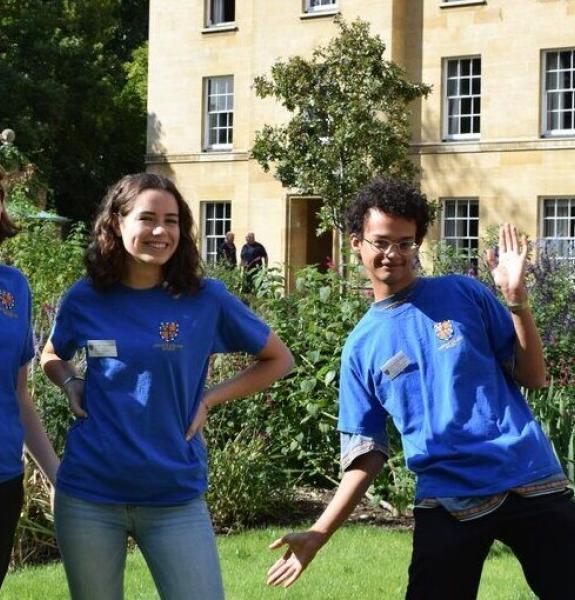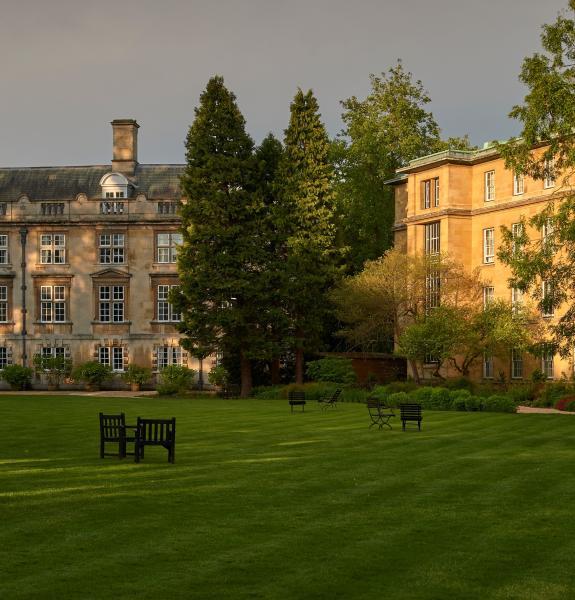
We welcome applications from students who are taking a gap year. When we talk with prospective students, we often come across some misunderstanding about what it really means to take a gap year, so let's first of all start with what a gap year is:
A gap year, in our eyes, is simply a year between school and university. Although it is, of course, possible to travel, work with charity schemes, or study in another country (and it can feel when you initially start reading that this is what all gap year students do!) for many of our applicants these activities will be difficult to fund. Please don't feel pressured to do a particular thing or fit a particular model for your gap year, as in reality, many of our students who take a gap year live at home for all or at least part of the year, take a job locally to earn money and pick up some experience, as well as using some of the extra time to do valuable reading or other preparation for their degree. We also have a good number of international students at Christ's, some of whom come from countries where it's the norm to do National Service before starting at university. All of these options are valid and productive as gap years, and they can bring with them some very useful skills and experience for the future.
When you start thinking about a gap year, we recommend that you have a look at the UCAS gap years page, which helps you to think about the pros and cons, the different options, and what you want to get out of your year.
In the information below we have provided further detail that we hope will answer most of your questions about how a gap year can fit with an application to Christ's. If you have any questions after reading it, please feel free to send us an email, and we'll do our best to help.
- How common is it for Cambridge students to take a gap year?
- When should I apply?
- Is there anything I will need to do for my course during the year?
- Student profiles
- Further information
How common is it for Cambridge students to take a gap year?

On average, 20-25% of our intake at Christ's comes to us following one or more gap years. In every subject offered at Christ's, we are neutral about gap years, which means that we don't mind whether you take a gap year or not. We hope that you will research the options and make the best decision for you according to your preferences, circumstances and resources.
A few of points are worth making:
- Cambridge terms are very short (we have intensive 8-week terms) with just under a week either side where you'll have meetings and social events to mark the beginning and end of term. If you prefer not to take a gap year, do bear in mind that there will be opportunities between terms for things like work experience and placements as well. In the summer, for example, term ends in mid-June and you don't come back until the beginning of October so you have more than three months that you can use. Once you are a student at Cambridge, you will be able to use the University Careers Service, which can help both with your career after you graduate and with summer placements etc.
- If your primary reason for taking a gap year is to earn money to fund your studies, bear in mind both the point above, and we also recommend that you read about the financial support available to Christ's students. The finance section will help you to explore the details.
- Some of our applicants take a gap year in order to take one or more additional subjects. If your school subject combinations did not meet the requirements for the course you are interested in, a gap year can give you an opportunity to take additional A level or equivalent courses. Note that in this case, you would need to apply during your gap year rather than in your final year at school or college, and if you are selected for an offer in late January, this would normally be a conditional offer asking you to achieve a grade or grades in the subject(s) you are taking in the gap year.
- Some students take a gap year because they prefer to apply once they already have their exam results rather than being given a conditional offer while they are still at school, or because they want to reapply to university. This is absolutely fine, and we have a page with information about post-qualification applications, which we hope you will find helpful if you are considering this option.
When should I apply?
If you would like to take a gap year, you can choose when to apply:
- You can apply in your final year at school for deferred entry. You would apply in on the basis of predicted grades, and if we make you an offer in January, it will be a conditional offer asking you to meet the academic conditions we have set when you take your exams. Some students find it easier to apply whilst they are at school and have easy access to teachers, referees and anything that the school helps with. Do also bear in mind that if your application is unsuccessful, there is nothing to stop you from reapplying the following year.
- You can apply during your gap year and make a post-qualification application, which means that you'll already know your A level, IB or equivalent results when you apply so if we select you for an offer, we would normally be able to make you an offer without academic conditions. If you apply during a gap year, do ensure that you have regular internet access during the application period, check your email regularly and ensure that you are aware of any admissions test registration deadlines and test dates, and are available for interview - this may affect your plans.
Is there anything I will need to do for my course?

It will be important to keep any skills that need regular practice sharp during your year out and ensure that you do any work needed to be ready to start the Cambridge course in October (in some subjects it may help to do some revision), as you'll need to 'hit the ground running'!
A gap year is a great opportunity to read and some departments have lists of recommended books such as the Natural Sciences suggested reading or the Economics recommended books. Alternatively, you may have found other useful material in a local library. If you've applied for one of the languages courses, reading in a foreign language takes a lot of practice. Do make use of your time to read some easy material in your target language and to pick up as much grammar and vocabulary as possible. This will be incredibly useful once you start the course. The Modern and Medieval Languages Faculty FAQ's include further information about preparation for that course.
If your Cambridge course is an essay subject, many students find it useful to find ways to keep writing, whether you make contributions to an online journal, keep a blog, or make a website on a favourite author or topic. Although it's not a requirement, some students find MOOCs (Massive Open Online Courses) helpful as a way to structure some further learning. The Complete University Guide offers an introductory article on MOOC's, and, for example, FutureLearn partners with UK and international universities and other institutions to offer free online courses. See the partners and courses. If you are doing a MOOC, please send us a summary of your course syllabus when you apply (see information about sending additional documents, once the current applicants section is published).
If you will study Mathematics or a maths-based course at Cambridge, do make a plan for how you will maintain and develop your maths skills during the year. Useful resources for maths students include the STEP Support Programme, the Advanced Mathematics Support Network A level enrichment and extension resources and Maths links. Some students find it useful to take a course or an additional qualification in mathematics or work through a textbook in order to structure their progress and gain further skills. You may also like to visit science museums or attend public lectures / a science festival (we would of course plug the Cambridge Festival, run by the University Public Engagement team but others may be closer to you).
Finally, if English is not your native language, don't forget to practice your English Language skills regularly as well. If you're able to find a native English speaker who you can talk to regularly, that is ideal, and you may also want to practice writing in English. Everything that you can do to make your transition to Cambridge as smooth as possible will be helpful and you may want to have a cheeky look at what we say to our offer holders (scroll down to resources).
Student profiles
Esme, Ollie, Hannah, Oscar, and Fred all took gap years before coming to studying at Cambridge. You can read about their experiences in their student profiles:
Further information
Back to Undergraduate Admissions main page / How to apply / Post-qualification applications




